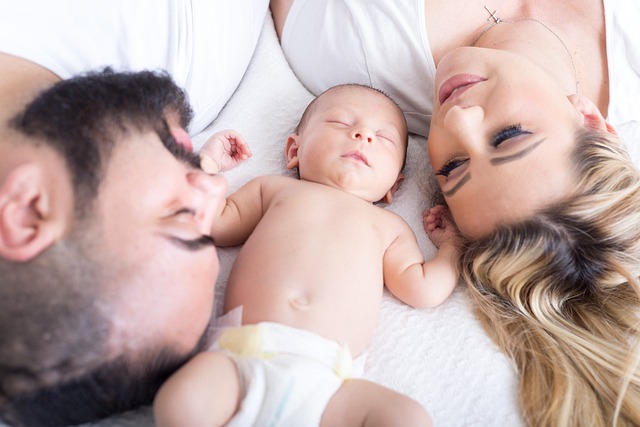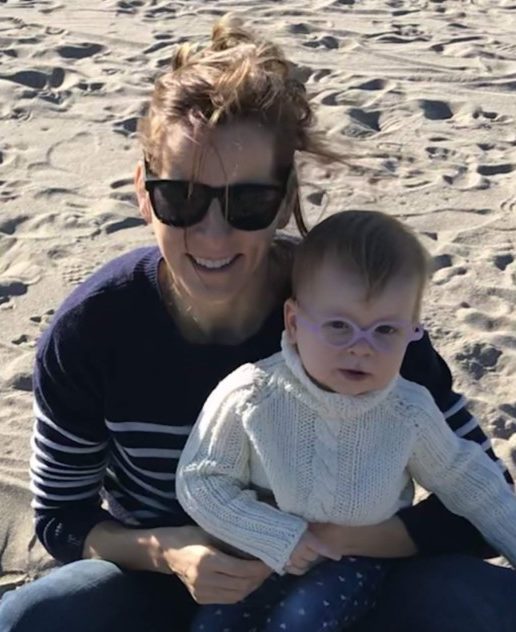
As parents, we all have ways we cope to be able to get everything done and give our children what they need. Sometimes, it is easier to put a band-aid on a situation than deal with it immediately. Some of you may be using a coping mechanism to deal with sleep—maybe for a baby, a toddler, or a five-year-old who has started waking at night. I see this often, and parents usually say something like, “Well, I hoped it would get better as he got older,” or “It was easier to just get him back to sleep by feeding, but now he is awake six or seven times a night!”
How many times have you thought, “I just don’t think he’s ready for sleep training yet,” or, “I know it’s a bad habit, but it’s working for the time being. I’ll wean him off of it soon.”
I want to address some common concerns and questions that I see and answer daily for moms all over the country.
How much sleep do kids need to be healthy?
|
Age |
Hours of Needed Sleep |
Number of Naps |
| Newborns (0–3 months) | 16–18 hours per day | 4–6 |
| Infants (3–6 months) | about 15 hours a day | 3 |
| Infants (6–12 months) | about 14 hours a day | 2 |
| Toddlers (1–3 years) | 12–14 hours a day | 1 |
| Toddlers (4–5 years) | 11–12 hours a day | 0–1 |
| Children (6–8 years) | 9–11 hours a day | 0 |
The sleep is broken up in various ways depending on age. Younger babies will take as many as 5–6 naps a day, and this decreases to one nap between ages 2–4. Most children stop needing a nap around age 3 and the required sleep all comes overnight.
An important aspect of this is the wake time—the amount of time a baby is awake in between naps. A wake time for a newborn is as little as 30–45 minutes! If your baby is awake longer than that, they become overtired and it starts to get difficult to get them to sleep. A child that is overtired is their own worst enemy when they attempt to get to sleep. This is often when parents resort to feeding, rocking and bouncing their baby to sleep, often holding them throughout the nap.
What if my toddler is waking up and coming to my room to sleep in my bed?
This is extremely common! The only way to stop this is to make a firm boundary and stick to it. Explain the rules that everyone has their own bed and your child needs to stay in their bed at night. If they get out, calmly walk them back and if they will not stay in bed you’ll need to find a consequence that works for them to follow through.
I often work with families to find the appropriate consequence for their child. It typically only takes 2–3 nights of reinforcement for this to work, assuming it is consistent. I also like an OK to WAKE clock. This is a clock that will turn green in the morning when it is an appropriate time (chosen by you) to get up. This gives the child a visual reinforcement to watch for rather than an abstract idea of time. You can find these clocks on Amazon for about $20.
What does a bedtime routine look like?
I like to keep the bedtime routine short and simple! The idea is that anyone (a grandparent, a babysitter, etc.) should be able to come in to your house and take over the routine smoothly. This way you can enjoy a night out to dinner! Your child should be able to anticipate all steps in the routine since it is the same every night. We all like routine and kids thrive on routine and consistency. Keep the routine to 30 minutes. It may look something like this:
Bath/PJs/Books/Songs/Kisses. Often, I end the night by talking about the day. I ask my toddler his favorite part of the day, and it is a great way to wind down and get some insight into their minds!
The more you let your child ask for “one more book!” or “one more sip of water!” the more they will push the boundary. Keep the boundary clear and firm and they will respond wonderfully!
Bedtime for newborns tends to be a little later (9:00 PM), but should work its way back to 6:30-7:30, depending on naps. Bedtime for kids ages 1-4 should be 7-7:30pm. By, age 5, a little later is ok, just be aware of the time they need to be awake for school and be sure they are asleep with enough time to get that required 11-12 hours per day. This often means bedtime should stay at 7:00 PM!
Also, be sure any screen time is over at least 1 hour, (ideally 2), prior to bedtime. Screen time can stimulate the brain in a way that makes it difficult to wind down and get sleepy. This goes for adults as well and honestly, is something I need to be better about for myself.
 How do I create a good sleep environment?
How do I create a good sleep environment?
- Very dark room—use blackout shades
- White noise
- Cool temperature
- One or two stuffed animals or special toy in bed (no toys or blankets for babies)
Teaching your child great sleep skills isn’t a one-night operation. It takes time, a lot of consistency, and more than a little bit of diligence on the part of parents. I can promise you that the end result is worth it: free evenings with a quiet house and a well-rested and happy child!
[hr]
 Liza Rohn
Liza Rohn
Liza is certified pediatric sleep consultant and the founder of In Your Dreams Sleep Consulting. She has a bachelor’s degree in psychology from the University of Rochester and a masters degree in Speech-Language Pathology from Northeastern University. She worked as a Speech-Language Pathologist for 13 years in a variety of settings including Early Intervention, preschools, elementary schools, private clinics, home visits, and hospitals-both inpatient and outpatient.
More recently, she has become certified as a sleep consultant after realizing how important sleep was for her children. Her passion for sleep led her to pursue opportunities to help other families experience the life changing benefits. Liza completed training with Sleep Sense™ founder, Dana Obleman. The Sleep Sense program is 1 of only 5 pediatric programs recognized by the Association of Professional Sleep Consultants. It is based on the latest pediatric sleep science so you can rest assured in knowing you are getting knowledge based on science rather than opinion.
Liza recently moved to the Bay Area with her husband Daniel, and 2 children Luke (4) and Evelyn (1). She hopes to bring peace of mind and ability to rely on good sleep to all families! Follow her on Facebook at In Your Dreams Sleep Consulting.
















